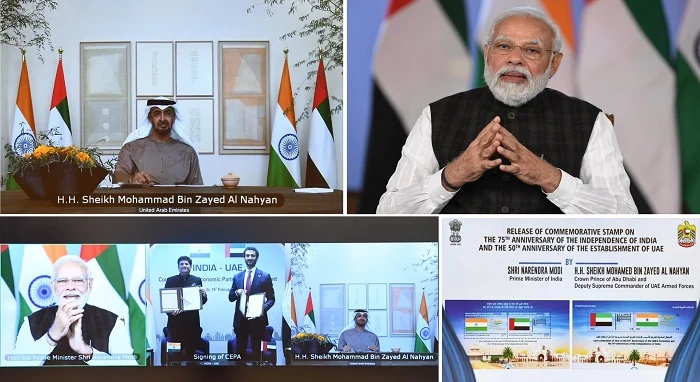In a major move, India and UAE today signed and exchanged the India-UAE Comprehensive Economic Partnership Agreement (CEPA) during the virtual summit held between Prime Minister Narendra Modi and Crown Prince of Abu Dhabi Sheikh Mohammed bin Zayed Al Nahyan.
The Agreement, signed by Commerce and Industry Minister Piyush Goyal and UAE Minister of Economy Abdulla bin Touq Al Marri in the virtual presence of the two leaders, will provide significant benefits to the Indian and UAE businesses, including enhanced market access and reduced tariffs.
As reported by IndiaNarrative.com earlier, it is expected that the CEPA will lead to an increase in bilateral trade from the current USD 60 billion to USD 100 billion in the next five years.
Both leaders expressed deep satisfaction at the continuous growth in bilateral relations in all sectors while issuing a Joint Vision Statement 'Advancing the India and UAE Comprehensive Strategic Partnership: New Frontiers, New Milestone'.
The statement establishes a roadmap for a future-oriented partnership between India and UAE and identifies focus areas and outcomes. The shared objective is to promote new trade, investment and innovation dynamic in diverse sectors, including economy, energy, climate action, emerging technologies, skills and education, food security, healthcare and defence and security.
The two leaders also released a joint commemorative stamp on the occasion of the 75th anniversary of India's independence and 50th year of UAE's foundation.
The two MOUs signed between Indian and UAE entities – between APEDA and DP World & Al Dahra on Food Security Corridor Initiative and MOU between India's Gift City and Abu Dhabi Global Market on cooperation in financial projects and services – were also announced during the summit.
Two other MOUs – one on cooperation in climate action and the other on education – have also been agreed between the two sides.
Joint commitment to the fight against extremism and terrorism
In view of the recent terror attacks against the UAE, Prime Minister Modi reiterated India's full solidarity with the leadership, government and people of the UAE and offered condolences to the UAE over the victims of this cowardly terrorist act.
Both leaders reaffirmed their joint commitment to the fight against extremism and terrorism, including cross-border terrorism, in all forms, at both regional and international levels. They agreed to deepen their bilateral cooperation in the fight against terrorism, terrorist financing and extremism.
In this context, they emphasized the importance of promoting the values of peace, moderation, coexistence and tolerance among peoples, and stressed the need for all forms of terrorism, extremism, violence, hatred, discrimination and incitement to be renounced.
"The leaders agreed to support international efforts to maintain peace and security in the region and resolve regional conflicts, including efforts to support the reactivation of the Middle East Peace Process in line with the two-state solution and based on the relevant United Nations Security Council resolutions and previous agreements between the parties," stated the Joint Statement.
"They expressed hope that the Abraham Accords will contribute to regional peace and create positive change for the Middle East region," it added while recalling the importance of maintaining and strengthening peace in the Middle East.
PM Modi thanked the Crown Prince of Abu Dhabi for taking care of the Indian community during Covid pandemic and also invited him to pay an early visit to India.




















